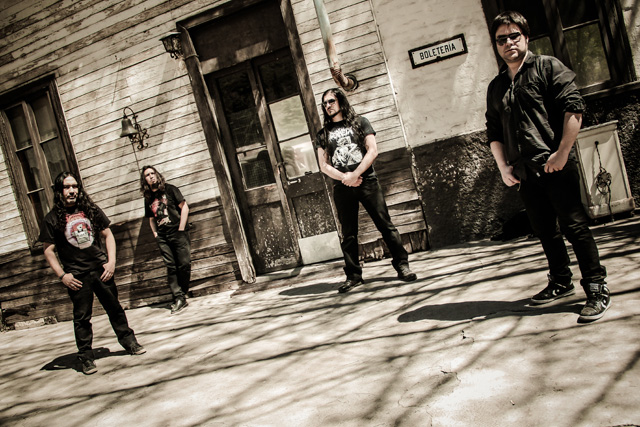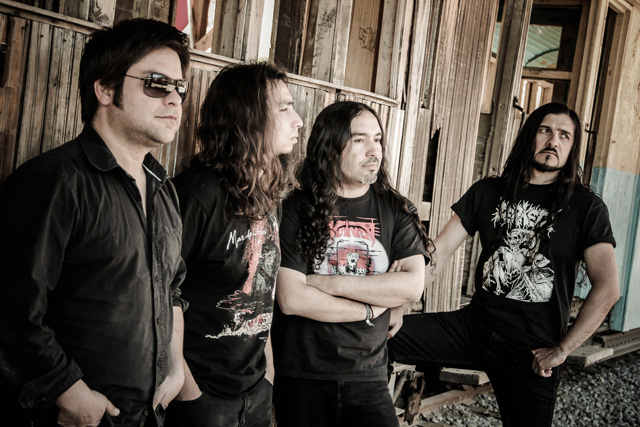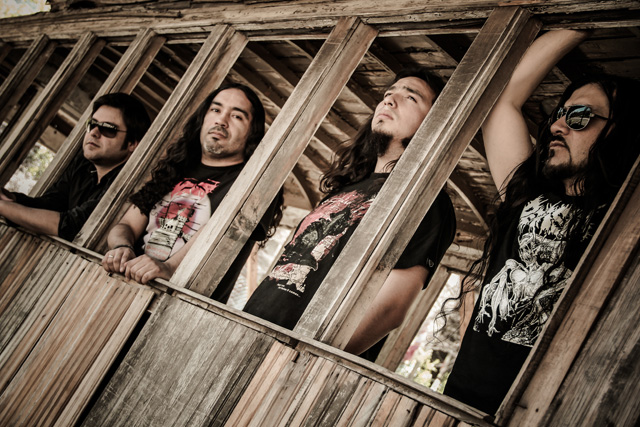With the Solitude Productions re-release of Chilean death, doom, prog wizards Poema Arcanus still making our ears tingle at Ave Noctum, we eagerly fired off some questions to Igor Leiva (guitars) and Claudio Carrasco (Vocals) when the opportunity arose. And just like their album, the results are highly thoughtful, intriguing and articulate and one of the most genuine and open interviews. Read on, it’s worth your time.
AN: Hello Poema Arcanus, I hope this finds you well. Welcome to 2014, thank you for taking the time for this interview and congratulations on your latest album Transient Chronicles, just re-released. It really is a fine a work and has grown on me even more since the review.
Igor: Cheers man, thanks for your words. We are glad you gave the album the spins it needs… haha.
AN: Transient Chronicles is a deep and complex work: Is there any overall theme to the album?
Igor: I’m not sure if it goes as far as being an overall theme, but there’s for sure a certain tendency to address the subject of life as something brief, fragile and unexplainable. Some recent personal life experiences have led us to go into those topics more, and of course the fact that we are not getting any younger places death and the frailty of life as an increasingly relevant topic into our lyrics.
Death is focused from some sort of existentialist point of view, but we try not to get into a pretentious whining mode, nor over dramatize the subject. Instead we try to speak about it in the form of some somber, rough poetry.
AN: I was particularly interested in the lyrics for the song ‘Our Little Blood’, the references to blood and ‘the ten percent ‘. Can you elaborate on this song and its meanings?
Igor: Those lyrics were written by Claudio, so it’s better if he answers this question:
Claudio: As the name of the band refers to cryptic poetry, our lyrics are for the most part metaphorical; where the concepts are not necessarily clear or meant to be clarified in a one-way interpretation. We encourage the listener to interpret them in his/her own way. But as you are asking specifically about those terms and you are a very cool guy, I can give you some clues (haha).
Blood symbolizes life and the 10% refers to statistics on the probability of spontaneous abortion in humans. Does that clarify your doubt? The rest of the story I think you can imagine yourself.
AN: How do you go about writing songs that go from death metal to some pretty progressive and even mellow passages, and yet still make sure the song flows properly? What is the writing and recording process like? Does anyone take charge?
Igor: First, on the songwriting process; there are two important aspects here: the basic songwriting and the actual “song-crafting” as I like to call it. The basic songwriting is when you come up with the pieces of music that will eventually become a song. That usually happens at home and it’s a one man process. Then we bring these ideas, riff sequences, etc., to the rehearsal room and start working on them as a band. Many times the songs change a lot at this stage –the “song crafting” process-, with the input of the whole band, and that’s when they become real songs.
Although most of the basic songwriting is made by me (on our previous album I was in charge of all of the music… which I’m not sure it was a good idea), this time we had lots of riffs, melodies, etc. that the other band members brought to the rehearsal room, and which ended up being songs after we processed them in our rehearsals, so it’s far more of a group collaboration in that aspect this time, something I think is pretty cool in terms of more variety for the album.
I think one of the most important things in our music is to achieve that flow you speak of. We see our songs as organic entities where hopefully every time there’s a change into the song you should feel like there was no other way the song could have changed. I mean, every part should feel like it belongs to the song, and for that same reason how the music morphs and evolves from one place into the next is crucial. I hate when bands sound like a collage of styles and a collage of riffs that are stuck next to each other without a real connection. How you articulate those parts for us is fundamental, and that takes sometimes a bit of simple musical theory and always lots of intuition.
AN: You seem to draw on a wide variety of musical inspiration: Which bands were important to you growing up, which ones have influenced you since starting Poema Arcanus? What are your musical backgrounds? How did the band actually start?
Igor: The band started with Claudio (vocals) and me being high school classmates with similar musical tastes. We just started the band, but at first couldn’t find the right band members up until 95’ when we released or first demo (“Underdeveloped” under the moniker “Garbage” as we were called back then).
Our initial influences were basically all of the bands that came from England in the late 80’s-early 90’s: I mean: Napalm Death, Carcass, Paradise Lost, Godflesh, Bolt Thrower, etc. All of them were very different between themselves, but we liked them all, so at first we had this sort of chaotic style where we would have a grinding song, then a doomish one, etc, etc.
As time went by we realized that what we did best was the more doom-oriented stuff, so our style evolved into that path, while we never ditched our “other” influences. After our first album we started adding some progressive elements that came from our fondness on bands such as Voivod, Rush, old Queensrÿche, and the like, but as I told you, we have always tried to find a right balance between all these things we are mixing in, avoiding the collage effect I told you about.
AN: This is (I think!) your fifth full length album. That is an impressive history by any band’s standard, but more so when working in a non-mainstream style. How do you keep the enthusiasm and commitment going?
Igor: Well, it’s just about loving what we do. When you make this kind of music located in such a distant place as we are, you never have great expectations of massive success or anything like that, but you do it more as a personal need to exorcise demons, express yourself and give this sometimes hollow life some sort of meaning, seriously. I always say that quitting the whole band thing would be like trying to escape from your own shadow, so when we have to face some disappointing times, we just stick to our guns and keep going no matter what. We are also lucky to have small but really loyal following here in our country, so their support also helps to keep the spirits high.
AN: I assume that, like most extreme metal bands, this is not something you can make a living out of. How do you balance work and your impressive musical output?
Igor: It just takes dedication and discipline. And having a lot less spare time than the average guy I think… haha. We all have regular jobs of course, but that has never been an obstacle to keep going. With time you end up adapting. Actually on the rare occasions we haven’t been rehearsing for a while, I really miss it and hate having that much spare time… no kidding.
AN: How did the re-release through Solitude Productions come about? It has at least managed to get the album heard a little more widely I hope?
Igor: Well, it happened just in the normal way I suppose, we just sent the album to check for any interest in releasing it. We first released it through a local label (Australis Recs.) because we were about to go and tour Europe, so we needed to have it out really quick in order to have the CDs for merch and promotion during the tour, that’s the reason for that first release; but the idea was always to have an European label to release it because of the better possibilities it gives us in terms of exposure and distribution. I think this interview is proof that it has worked so far.
AN: For those of us who have never been, can you tell us a little about Chile and how it affects your music? From my very limited knowledge Chile has always seemed to have had a difficult history but bursting with a passion for words, and in a short Chilean film I know based on H P Lovecraft’s ‘Pickman’s Model’ it was described by a character as ‘the most gothic country I know’. Does any of this ring true? Does any of it inspire your music?
Igor: To some extent it rings true in the sense that within South America we are not the happiest of the countries. Besides our recent history with dictatorship and its tragic consequences; we don’t have this sort of tropical thing going on as strongly as some other countries such as Brazil, Venezuela and Colombia, for example. I think most of this has to do with the character of our native cultures which were known to be very shy people, and geographical factors such as isolation provided by the Andes mountains in the east and the Pacific Ocean in the west; and also the fact that instead of the tropical landscape we should have in the north because of the latitude, we have the driest desert in the world. Of course we are no Norway or something like that, but on the subject on how it affects the music made in here, the amount of doom bands, or really dark death metal bands that we have in Chile sort of answers the question.
AN: I’m afraid that other than Procession (who are mostly Europe based now) I know little of the metal scene there. Is it big? Is there a certain style or styles that are more prominent than others? Do you get to play live much? Where are you based?
Igor: It’s a small scene actually. Just to put an example, Felipe from Procession was our roadie for a while when he was still living in Chile, and Claudio from Procession was our bass player for 11 years, so almost everybody who plays in a band knows each other in here.
As I told you the most prominent styles are death metal, and there’s also a bunch of doom bands as well. Of course there’s also plenty of thrash, heavy, black too, but I think the most representative styles in terms of abroad recognition must be death metal and doom. Besides Procession, another doom band that got some international recognition was Mar de Grises, who recently split up unfortunately; and in the Death Metal side we have the old Pentagram, Atomic Aggressor, and more recent acts which are more into the occult death/black/thrash thing such as Wrathprayer.
We are based in Santiago, and we play in Chile once or twice a month on average, on different cities, where we get to meet many good old and new friends and some really cool bands as well.
AN: Where should any visiting metal fans look for live music if they’re lucky enough to get to Chile?
Igor: There’s a bar where many of the metal gigs happen in Santiago which is Bar Oxido, it’s a really small venue, but you’ll probably find something happening there every weekend and on some weekdays too. Beer isn’t expensive, and it’s located pretty much in downtown so it’s easy to get there. There’s some other venues where you can find metal gigs every once in a while, but for a foreigner I think Bar Oxido would be the logical choice.
AN: Have you played outside Chile much? Is there any chance that we might see you all the way over in Europe?
Igor: Well as I told you on a previous answer, we toured Europe in October-November 2012. We were in Germany, Belgium, The Netherlands, Austria, Hungary and Poland. The highlights were the “Dutch Doom Days” in Rotterdam and the “Doom Over Vienna” festivals. It was a small tour done on a DIY fashion but of course we are looking forward to do it again hopefully in the near future.
Within South America, as strange as it might sound, we have only played in Argentina once, as it’s kind of difficult to book something for a band like us, given that the whole scene is not as professional as in Europe and touring here involves a great risk financially because that lack of professionalism and the huge distances between the more important cities.
AN: What have you got planned for 2014? Are you recording? Gigging? Resting?
Igor: Right now we are on the last leg of gigs in Chile to promote “Transient Chronicles”. That should keep us busy until early March (with some vacations in between). There are some plans to do gigs outside Chile in South America, but as it’s proven to be a very difficult task in the past, we prefer not to announce anything beforehand.
After that we need the muses to come down and kick our asses to start writing some new stuff. That process is the most interesting thing of all of this, as right now we don’t have the slightest idea of what our next music is gonna be like… only time will tell. After that of course it is time to record again, and after that hopefully go and spread our noise on European Soil again.
AN: Thanks again for your time, and I wish you all the best with three new album, it certainly deserves a wider audience.
Igor: Thanks a lot for your interest in our music and for your words as well. Cheers from the end of the world!!!
There you have it. I really want to thank Igor and Claudio for their time and for being so open and thoughtful with their answers. A real pleasure.
Get hold of their album Transient Chronicles, people. You won’t regret it; the more you listen, the more it opens up to you.
Interview by Gizmo





Leave a Reply